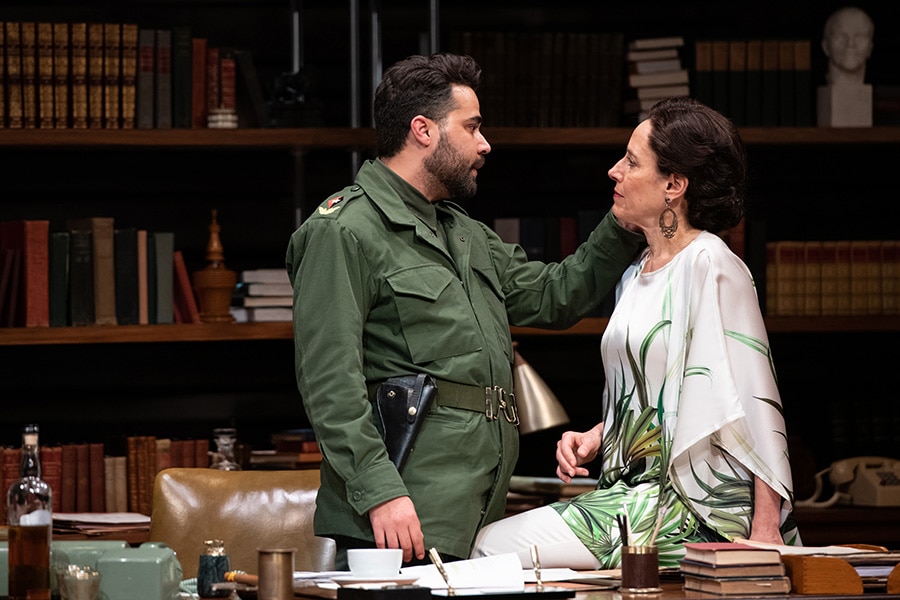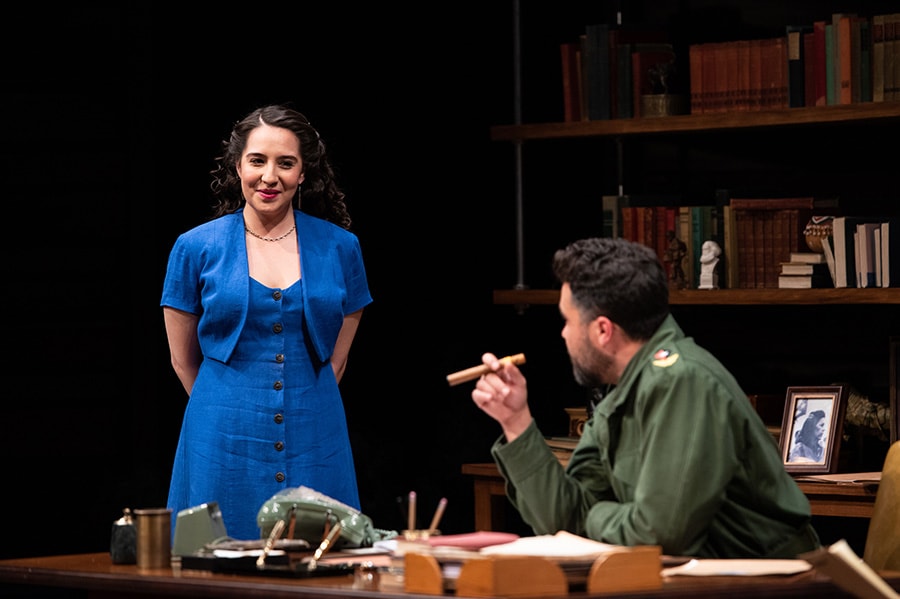Part of Arena Stage’s ongoing Power Plays, the world premiere of Celia and Fidel transports the audience back to a time when Fidel Castro was not just a name in the history books, but a feared revolutionary only 90 miles from the Florida Keys. The admirable commissioned work by Eduardo Machado brims with history inspired by real events.

Through its four characters, Celia and Fidel speculates aplenty about how Castro came to the April 1980 decision that upended the lives of many thousands of Cubans and resonates in America to this day. The drama conjures up conversations that led to what is known as the Mariel Boatlift, a mass emigration of thousands of Cubans who traveled from Cuba’s Mariel Harbor to the United States between April 15 and late October 1980.
In the Kogod Cradle, Arena’s intimate 200-seat space, music, sound and large Cuban flags transport the audience to Havana, Cuba, circa 1980. President Jimmy Carter has sent an envoy to Fidel to discuss a possible opening between the two long-estranged countries. It is a time when Fidel decided to plant the Cuban flag in Angola to show America its revolutionary zeal and powers. As for Carter, he is politically reeling with the success of the Iranian revolution.
Celia and Fidel reveals what might have happened during the negotiations between Fidel and the American envoy. Of particular interest, playwright Machado speculates as to who else was part of the their conversations as well as who might have influenced Castro in his decision making. Instead of Che Guevara or Raul Castro, Machado thinks it was Celia Sánchez, little known outside Cuba, but a key confidante and central player in revolutionary Cuba’s birth in the 1950s. Machado is quoted in the Arena Stage program: “I think they’ll [the audience] be fascinated by her. The hardest freedom to get is gender freedom.” He also added another key female character, Consuelo, Fidel’s young protégé and Celia’s rival.
Directed with assurance by Arena Stage Artistic Director Molly Smith, the bookish dialogue-centric script takes place in a single room, a richly burnished detailed library, with crammed bookshelves some 25-feet high. Credit goes to Set Designer Riccardo Hernandez, with gorgeous lighting by Nicole Pearce. Dramatic action, though, comes often via loudly-delivered lines rather than dramatic heat or physical actions. A hard kiss has some great dynamic power equal to the pulling of a revolver from a holster.
In Celia and Fidel, Fidel is rarely out of sight. The three other characters drift in and out; at major moments, all four are together. Andhy Mendez portrays Fidel as a volatile, dangerous man; he can be charming, but when crossed or suspecting less than absolute loyalty, he explodes into fury. While Fidel pushes around others as he pleases, he has a soft spot for Celia, the woman he has depended on for decades. Then again, know this about Celia: She has been dead for four months. As others wonder about his sanity, Fidel sees and has conversations with Celia; to him, she is no specter.

Marian Licha portrays Celia coolly. As Celia, Licha floats into view in several scenes, not as a ghost but with a live person’s weight and cheek. Celia knows her power over Fidel and thrills to it. When Licha is on stage, she holds the center of attention, arguing with Fidel on equal footing.
Impacting Castro’s prowess as a man of action is his young protégé Consuelo. Heather Velazquez plays her as a young woman with awesome spunk who wants to take the place of the now departed Celia. In one key scene, Consuelo fearlessly and fiercely proves her allegiance to Fidel. With costumes designed by Alejo Vietti, Consuelo unmistakably shows the arc in her journey from mere protégé to revolutionary.
Liam Torres plays the American envoy Manolo Ruiz, a man caught between two worlds. A onetime revolutionary comrade of Fidel’s, he now represents the despised American government. Torres gives his character a jumpy mien; he walks a tightrope without a net, never comfortable, always wary.
The possibilities for Celia and Fidel as rich history are apparent. However, Celia and Fidel can feel inert as a theatrical drama. It is literary history, with low heat. After seeing the production, I wondered if the title would have conveyed more had it been Celia and Consuelo and Fidel.
Celia and Fidel will especially hit the mark for those seeking a well-produced historical play about a time they may recall vividly. It also should interest those who want to know more of what may have prompted President Obama’s decision to open a US Embassy in Havana after so many decades without one, as well as the aftershocks of the current administration’s decision to re-mute relations between the two countries. Fidel Castro and what he left behind matters still.
Running Time: About two hours and five minutes, with one intermission.
Celia and Fidel will play through this weekend and then be suspended through at least March 30 at Arena Stage – 1101 Sixth Street SW, Washington, DC. For tickets, call the box office at (202) 488-3300, or go online.
Notes:
Jenny Male, Flight and Intimacy Coordination; Lisa Nathans, Dialect and Vocal Coach




